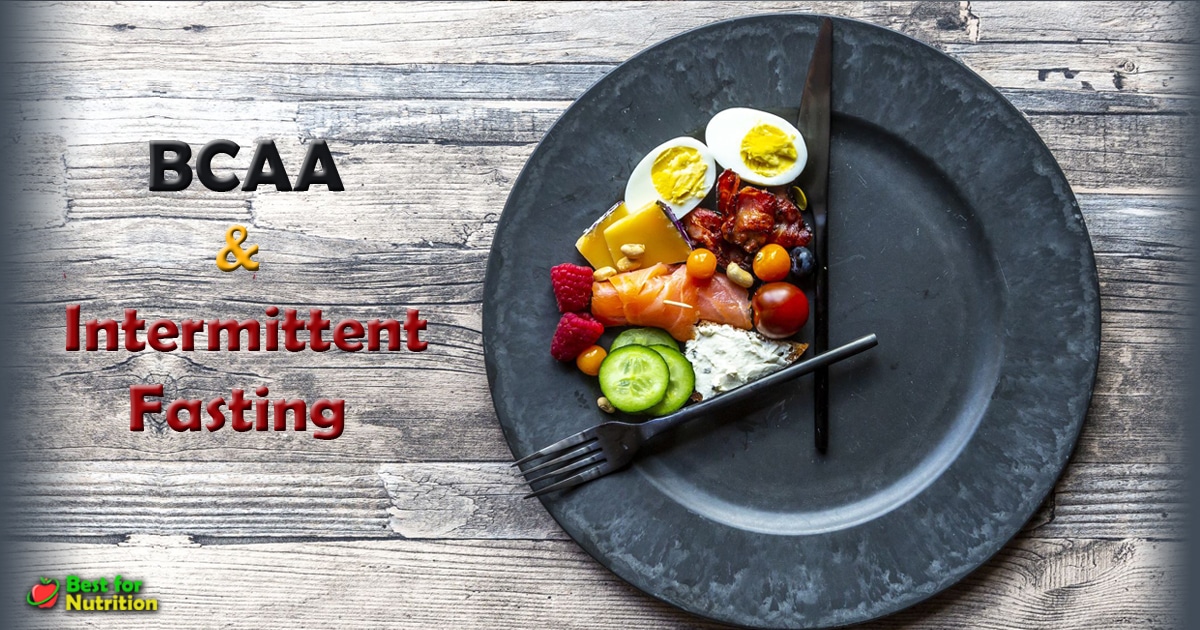Branched Chain amino acids (BCAAs) are well known for their muscle-building properties.
They help retain muscle mass, increase muscle synthesis, improve endurance, reduce exercise fatigue and the list goes on.
For fitness enthusiasts, BCAA supplements can make a world of difference in their workout performance and muscle gains.
However, they do have certain disadvantages as a supplement. Here is a list of pros and cons that will help you decide if BCAAs are worth your time and money.
- What Are BCAAs?
- The Pros of BCAA Supplements
- The Cons of Using BCAA Supplements
- List of Pros and Cons of BCAA
- FAQs

What Are BCAAs?
Amino acids are the building blocks of protein (1). There are 20 different amino acids that create thousands of proteins used by the human body. Nine of the 20 are the essential amino acids that the body can’t make and should be obtained through food (2).
Three out of these nine essential amino acids are called branched-chain amino acids (BCAA) namely leucine, isoleucine, and valine (3).
They have a chain branching off from one side, hence the name because of its molecular structure. 35-40 % of the essential amino acid in your body is BCAA (4).
They are predominantly responsible for muscle-protein-synthesis (MPS), the process through which muscles are built (5).
Leucine, one of the BCAAs, has the highest influence on stimulation and synthesis of muscles. The other two, isoleucine and valine support it functionally (6).
As a supplement, BCAAs come in pill and powder form and can be extremely effective in optimizing your workouts.
Summary: BCAA is the three essential amino acids, leucine, isoleucine, and valine. They are specialized in boosting protein synthesis and should be obtained from food or supplement.
The Pros of BCAA Supplements
The Advantage of Having a Branched-Chain Structure
The branched structure of these amino acids makes it easier for the body to utilize them during intense training (7).
Because of their unique structure, BCAAs can be digested in the skeletal muscles directly without going through the liver.
This property makes them a source of instant energy for the skeletal muscles.
Summary: The unique structure of BCAA allows them to directly metabolize in the skeletal muscles and provide instant energy during exercise when required.
Muscle Protein Synthesis
The BCAAs activate a key muscle-building pathway called mTORC-1 (8). This stimulates muscle protein synthesis and helps in muscle growth (9). Combining the intake of BCAAs with weight training can result in the maximum synthesis of muscle.
Leucine, one of the BCAA, has the highest effect amongst others.
BCAAs also activate enzymes such as protein kinase that initiate phosphorylation reactions and increase muscle protein synthesis (10).
Summary: BCAA stimulates enzymes and activates pathways that help in muscle protein synthesis. Amongst all the BCAA, leucine has the maximum effect.
BCAA Improves Muscle Mass And Strength
Strong muscles are important to strengthen bones, maintain a healthy weight, control blood sugar, and so on. Muscle strength is very important to help reduce muscle injury during a workout.
Inactive muscles, pertaining to a sedentary lifestyle, cause loss of muscle protein, which decreases muscle strength. Without continued strength and resistance training, the rate of muscle mass decline is quite a lot.
BCAA improves this by promoting muscle protein synthesis and decreasing muscle protein breakdown (11). When coupled with an intense workout, BCAA improves lean muscle mass and gives strength to your muscles (12).
Summary: BCAA helps improve your muscle mass by favoring muscle protein synthesis and preventing muscle protein breakdown. Combined with proper exercise BCAA strengthens muscles and increases its mass.
Fat Loss and Lean Body Mass
BCAAs help with fat loss without compromising on your muscle mass. They prevent muscle breakdown during intense exercise and support overall muscle health (13).
They also can speed up fat loss effectively and can be taken alongside other fat burners. This way, BCAAs protect us from metabolic disorders that occur due to obesity such as fatty livers, diabetes, coronary artery diseases, osteoarthritis, and many more (14).
Summary: BCAA helps prevent weight gain and enhance fat loss while maintaining your muscle mass.
Source of Energy Production
BCAAs can serve as a source of energy when there is a deficiency of glucose (the primary energy source) (15).
These BCAAs are preferred by muscles for energy production because muscle cells have the necessary enzymes for the oxidation of BCAAs. They can also be directly converted into glucose and used.
BCAAs maintain ATP levels (Adenosine triphosphate), which provides energy to the body making it crucial in energy production. High energy during workout enhances endurance and lets you exercise more supporting weight loss (16).
Summary: BCAA can provide a sufficient amount of energy to the muscle and enhance endurance optimizing your workout. It aids ATP (energy molecule in the body), and can readily change into glucose in the skeletal muscles when needed.
Increases Exercise Endurance
This release of energy is of great use for improving your exercise duration and is utilized to increase the volume and intensity of your workouts. In other words, BCAAs increase your exercise endurance (17).
BCAAs also increase your endurance by reducing muscle fatigue. It lowers the level of serotonin during exercise, which is the biggest contributor to fatigue (18). BCAA does it by limiting the entry of tryptophan that helps produce serotonin in the brain.
Summary: By limiting the production of serotonin in the brain that is responsible for exercise-induced fatigue and providing energy, BCAA supplementation can increase exercise endurance helping weight loss.
BCAAs Protect Muscle From Exercise-induced Damage
BCAAs before and after workouts have a muscle sparing effect and can be crucial in reducing the muscle wear and tear of the exercise.
In our body, muscle proteins are constantly broken down and rebuilt (19). This balance determines the protein amount in the muscles. However, when the breakdown exceeds the synthesis, “muscle breakdown” or “muscle wasting” occur (20).
It can be due to natural causes like malnutrition, chronic infections, cancer, or be a part of aging. It can also be due to an intense workout with improper nutrition.
BCAA has shown to halt or slow this progression by reducing the activity of the protein breakdown pathway (21).
Summary: Muscle breakdown occurs when muscle protein breakdown exceeds muscle protein synthesis. BCAA supplement can halt this by boosting the former one and preventing the later.
BCAAs Reduce Delayed-onset Muscle Soreness (DOMS).
It is very common to feel soreness a day or two after the exercise. This soreness is the DOMS and develops 12 to 24 hours after exercise. It may last until 72 hours.
The tiny tears in the muscles after exercise is one of the main causes. As BCAAs decrease muscle damage, it reduces the length and severity of DOMS.
Studies have confirmed this by studying one of the indicators of muscle damage, creatine kinase. BCAA can reduce it and therefore, is a great supplement in decreasing soreness in the muscles (22).
Another reason for muscle soreness after intense physical exercise is the rapid depletion of glycogen stores and an increase in lactic acid accumulation (23).
BCAA can decrease it by restoring glycogen and nutrients faster in the body which in turn reduces DOMS (24).
Summary: Tiny tears and lactic acid accumulation in the muscles after intense physical exercise results in DOMS. BCAA supplements can decrease both the factors and reduce the onset.
BCAAs Have Low Calories
BCAAs have very low calories when compared to other protein supplements like whey or casein. Therefore, it can be safely taken for promoting weight loss in a calorie-deficit diet (25).
BCAA supplements have especially shown great efficiency in intermittent fasting or when taken while practicing keto-diet. BCAAs’ low calories have a negligent insulin spike that does not break your fast and take you out of your fat-burning state. However, it provides a quick boost for your workouts.
Summary: BCAAs have very low calories and hence can be a great addition to any calorie-deficit diet such as keto. It provides a quick energy boost without breaking your fast.
The Cons of Using BCAA Supplements
Depletes B-vitamins
B-vitamins are crucial in amino-acid-metabolism and a high level of BCAAs can very well deplete this vitamin in the body (26). As B-vitamins play an important part in everything starting from cognition to energy metabolism, lower levels of those vitamins can cause serious health issues (27).
The vitamins that are responsible for BCAAs metabolism in the body are vitamins, B1, B2, B3, B5, and B6. High dosage of BCAAs will have higher requirements of these vitamins reducing their availability for other important biological processes that also require the vitamins to work (28).
Therefore, balance is very important. You should take care that either the supplements are also fortified with these vitamins or make sure to include B-vitamin rich food in your diet.
Summary: High doses of BCAA can deplete important B-vitamins because of its excess use. This can disturb other important biological processes that are dependent on these vitamins directly or indirectly.
BCAAs May Lower Serotonin
Serotonin is a neurotransmitter that aids sleep by calming and relaxing your brain. Incidentally, it also means it causes exercise fatigue and reduces endurance during workouts (29).
Serotonin is made by the body from tryptophan (30). During BCAA supplementation, BCAAs compete with tryptophan and don’t allow this conversion, thereby lowering these serotonin levels (31).
They inhibit the tryptophan influx in the brain, reducing the serotonin levels. With lower levels of serotonin, you are more attentive and have a reduced feeling of fatigue.
Even though it is great when you are working out, there can be problems elsewhere. Serotonin is known as ‘happy chemical’ and is responsible for good mood, happiness, and a feeling of well being.
As the tryptophan level drops, so does the production of serotonin in your brain which may cause mood disorders and depression.
Summary: BCAAs reduce serotonin levels thereby preventing exercise fatigue. As serotonin is also responsible for good mood and good feeling, lower production can cause mood disorders.
BCAAs may Cause Sleep Disturbances
The amino acid, tryptophan, is the precursor of serotonin, and serotonin produces melatonin. This is a neurotransmitter and plays an important role in your natural sleep-wake cycle also known as the circadian rhythm (32).
Therefore, a decrease in serotonin levels may disturb your sleep (33).
The best solution to avert this problem is to include carbohydrates ( beans, fruits, and starchy vegetables) in your evening meal to manufacture serotonin.
Summary: BCAAs can disturb your sleep-wake-cycle by reducing the serotonin production in your brain. Serotonin is a precursor of melatonin, which is responsible for good sleep.
Cannot Replace High-quality Natural Protein Sources
BCAA supplementation is excellent for muscle building and weight loss and has been extremely popular among bodybuilders and weight lifters. But, when compared with high-quality protein sources like animal proteins, dairy products, eggs, nuts, and lentils, they are not a complete food as they do not contain all the other essential amino acids.
Other nutrients that are important for athletic performance and health such as carnosine, carnitine, glutamine, creatine, and vitamin B12 are available from these protein-rich foods.
However, BCAA supplements do not provide them and therefore can’t successfully replace high-quality natural protein sources. This is especially important in muscle protein synthesis where a larger array of total amino acids trigger a better effect.
Summary: Though BCAAs are excellent for muscle growth, they are only three amino acids. Hence, BCAAs can’t replace high-quality protein foods that have all the amino acids that are required by the body.
May Have A Negative Effect on Blood Sugar Metabolism
One of the BCAAs, leucine, signals insulin that promotes the muscle cells to take in the sugar and use it for energy. Even though it facilitates muscle growth, excess BCAA can drop it to a much lower level than needed causing low blood sugar (34).
This is one of the reasons why it is advised not to take BCAAs before surgery. It can spark an episode of reduced blood sugar level which isn’t ideal (35).
Summary: BCAA can activate insulin activity and promote glucose uptake by the muscle cell. This enhances muscle growth. However, excess BCAA may result in increased uptake, lowering the blood sugar level to an unhealthy level.
May Hamper Other Protein Metabolism
Excess BCAA intake may lead to abnormality in other amino acid metabolism in the body, which can have harmful effects. It can start to interfere with normal protein metabolism in the body that can lead to other problems (36).
So be careful with the BCAA intake and make sure you do not exceed the recommended level.
Summary: High concentration of BCAA may lead to abnormal protein metabolism and may interfere with important biological functions in the body.
Some BCAA Supplements Contain Inactive Ingredients
Some BCAA powders contain unnecessary additives that are of no use to the body. In fact, some may have harmful effects in high doses. Be careful of those and make sure you carefully look into the ingredients before using them.
BCAA capsules, however, aim to eliminate these fillers and try to be as pure as possible. You may opt for them.
Summary: Certain BCAA supplements have fillers and additives which are inactive and can be harmful in the long run. Make sure to check or else opt for BCAA pills.
BCAA Supplements Are Expensive
BCAAs are much more expensive than other protein powders. One such example is whey protein that contains a sufficient quantity of BCAAs plus all the other essential amino acids.
Whey supplements are in the range of 0.75$-1.31$/ serving whereas BCAA supplements 2-4$/serving.
However, BCAAs are very specific towards muscle building and its overall health. It does so with a very little increase in calories, which can be a boon to people who want to reduce weight.
Summary: BCAAs are more expensive than other protein powders which provide all the 9 essential amino acids including BCAAs in sufficient quantity.
BCAA Supplements are Not Suitable for Pregnant and Lactating Mothers
BCAA consumption has shown to become a solution to several human health problems, however, its excess consumption may adversely influence embryo development in pregnant mothers (37).
It has been related to both small and large offspring of mammals, including humans who are predisposed to develop metabolic disorders in adulthood. Hence, pregnant women need to be careful.
Lactating mothers should avoid excess intake of BCAAs because these might reach the infant through breast milk.
An excess of BCAAs in infants can cause a deficiency in the other amino acid metabolism as they compete for the same receptors (38). This may compromise the infant’s growth. Hence, lactating mothers should not have an excess of it.
Summary: Excess BCAAs in pregnant and lactating mothers can compromise on the fetus’s growth and later protein metabolism in infants.
List of Pros and Cons of BCAA
Lets quickly glance through the pros and cons of using BCAA.
Pros
- BCAAs promotes muscle synthesis (39)
- BCAAs improved endurance and boosts stamina (40)
- BCAAs reduce the Delayed Onset Muscle Soreness (DOMS) (41).
- BCAAs prevent exercise-induced muscle damage (42)
- BCAAs can provide energy for exercise and workout if needed (43)
- BCAAs are a great source of new glucose production when needed (44)
- BCAAs are beneficial in insulin sensitivity (45)
- BCAAs can boost weight loss and yet maintain muscle mass (46)
- In certain cases of liver cancer, BCAAs can help reduce water retention and decreasing the risk of premature death by nearly 7 % (47)
- BCAAs are an excellent low-calorie energy booster (48).
Cons
- Not suitable for pregnant and lactating mothers
- BCAAs may negatively affect blood sugar metabolism
- BCAAs can reduce serotonin production and cause mood disorders
- Low serotonin level can also hamper with your sleep cycle
- May dysregulate other protein metabolism
- May cause vitamin B complex deficiency
- BCAAs are pretty expensive in comparison to most of the other protein supplements
Frequently Asked Questions (FAQs)
Do we Need BCAAs? Are BCAAs Good or Bad?
BCAA is needed by everyone in some quantity and is an essential amino acid. It should be obtained from an outside source like your diet. The quantity of BCAAs that the body needs normally can very easily be taken from good quality protein food. Supplements are not needed.
However, if you are into an intense workout, weight lifting, marathoner, or an athlete, and are trying to build or sustain muscle, BCAA supplements can be a great addition.
This is mainly true when you exercise in a fasted condition where you want to lose weight without compromising on your muscles.
How to Use BCAAs?
Both pill and powder form of BCAA supplements are available. The pill can be taken with water and the powder form can be dissolved in water or some other fluid and consumed.
Drink plenty of water when taking supplements. 5-20 grams of BCAA daily can be consumed. You can split this dosage to two or three times a day, especially if it’s more than 5 grams (49).
When to Take your BCAAs?
There are no specific rules on the timings. But, depending upon your requirement you can time it as pre-workout, intra-workout, or post-workout supplement.
Taking BCAAs just before a workout can provide you with energy that can support your workout. They can help with muscle metabolism and reduce exercise-induced fatigue.
Taking BCAA supplements after a workout provides the necessary nutrients for muscle recovery and reduced DOMS.
Should You Take BCAAs on an Empty Stomach or Not?
Yes, you can take BCAAs on an empty stomach. In fact, it’s better that way. In an empty stomach, the amino acids take effect quickly and start working instantly.
Taking the supplement with food means that you have to wait for the digestion to progress before you actually start seeing the benefits.
In fact, taking BCAAs with food delays its speed and efficacy as you are waiting for your turn before being absorbed and released as you are competing against the other nutrients.
Is BCAA with Taurine effective in Reducing Muscle Soreness?
Yes, research has shown that taking BCAA with taurine reduces exercise-induced muscle soreness in healthy people who are not very active on a regular basis (50).
The Final Note
BCAAs have their own share of pros and cons. However, there are more pros than cons which makes it a great choice on a restrictive or a vegetarian diet, and people who want to build or preserve their muscle mass while losing weight.
The cons of BCAAs or BCAA negatives can easily be nullified if you follow the daily dosage listed on your chosen brand.
You may also adjust your food in a manner that helps balance the side effects such as consuming B-vitamin rich food or not taking BCAAs in the night.
If used as per the directions, BCAAs can be a great addition to your diet and help in muscle gain and performance maximization.





